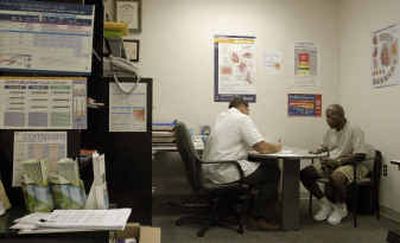Drugstores try to deliver more

CAMP HILL, Pa. — Jaime White helps her diabetes patients understand how to manage their blood sugar, checks their blood pressure and sometimes examines their feet for signs of nerve damage common to diabetes sufferers.
Her patients are West Virginia state employees participating in a program offered by Rite Aid Corp., the nation’s third-largest drugstore chain. They meet with White at a drugstore, and their insurer pays the bills: $80 for initial visits, $20 for follow-ups.
Customers have long called on pharmacists like White to do more than fill prescriptions. But drugstores, from giants like Camp Hill-based Rite Aid to smaller regional chains, are looking to expand their counseling programs and boost revenue — a trend that could be bolstered by the prescription drug benefit that will become available to Medicare enrollees in 2006.
“Many of (the chains) have started to look at how they can transform a pharmacy from a place where one can obtain drugs into a place where you deliver health care,” said John M. Coster, vice president of policy and programs for the National Association of Chain Drug Stores.
The chains say regular patient consultations help patients stay healthier because many patients don’t take their medication correctly. As a result, they say, both patients and insurers will save money.
But to provide pharmacists’ time and private rooms for consultations, stores need to be reimbursed by insurers, as White’s program is, the companies say. The hurdle is getting insurers to agree — such reimbursement is common for pharmacists who work in nursing homes, but nowhere else, those in the industry say.
Under the law President Bush signed in December, insurers providing Medicare drug plans must provide a medication consulting service for patients whose illnesses and prescription use meet certain thresholds. The federal government has not finalized how the programs will work, and there are conflicting ideas over the final regulations.
Drugstores and pharmacist groups want retail pharmacies to play a significant role. Insurers generally support the idea of pharmacist checkups, but want more flexibility.
For instance, some insurers already have in-house systems in which enrollees can consult by telephone with a pharmacist, which they would like the regulations to accommodate, said Mohit Ghose, a spokesman for America’s Health Insurance Plans, a group that represents insurers.
Rite Aid has pilot programs for Washington state’s Medicaid program and West Virginia’s state employees. Walgreen Co., the nation’s largest drugstore chain, has a handful of pilot programs in states including Wisconsin, New Mexico and Texas.
“We’re looking at the potential there to expand services,” Walgreen spokesman Michael Polzin said. “Certainly, the new Medicare program could help move these along. … But a lot of that depends on how the final regulations look.”